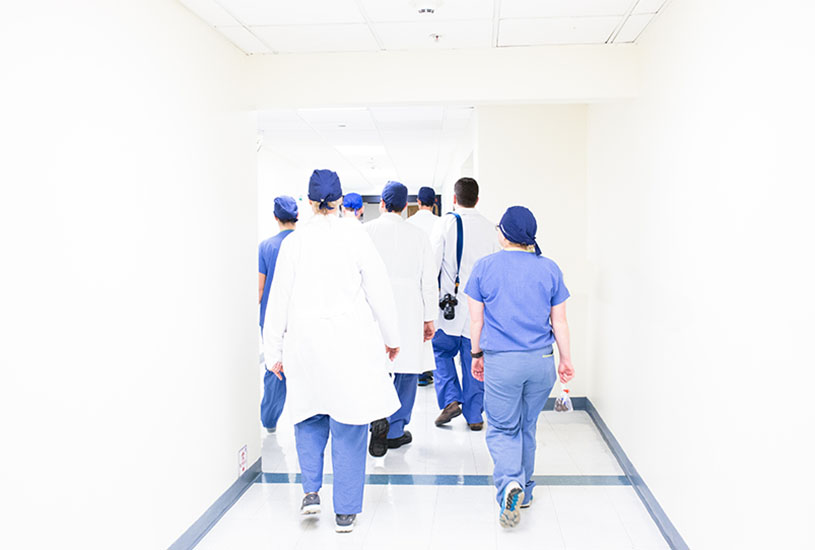Deakin research teams will advance projects that aim to reduce childhood allergies, improve cardiac rehabilitation and build patient health literacy.
Many Australians are likely to benefit from three innovative Deakin University research projects that have been funded by the National Health and Medical Research Council (NHMRC) in the funding round announced today.
The projects seek to build understanding of the development of childhood allergies, aid cardiac rehabilitation through a smartphone-delivered program and improve health literacy via a “teach back” approach that aims to ensure patients have understood their clinical instructions.
Deakin’s Deputy Vice-Chancellor Research Professor Peter Hodgson congratulated researchers from the Institute for Physical Activity and Nutrition (IPAN), School of Medicine and Centre for Population Health Research, for their success in a highly competitive application process.
[testimonial_text]This funding will help continue Deakin’s cutting-edge medical research, which is focussed on improving the health and wellbeing of the communities we serve.[/testimonial_text]
[testimonial_picture name=”Professor Peter Hodgson” details=”Deputy Vice-Chancellor Research”]
 [/testimonial_picture]
[/testimonial_picture]Protecting children from allergies
Professor of Paediatrics in Deakin’s School of Medicine, Peter Vuillermin, has received an NHMRC Project Grant to further his team’s work investigating the relationship between a pregnant mother’s gut bacteria and her offspring’s risk of developing allergies.
“Our hypothesis is that maternal carriage of gut bacteria known as prevotella is associated with decreased risk of a baby developing asthma and food allergies,” Professor Vuillermin said.
Professor Vuillermin and his team have been evaluating data from the Barwon Infant Study (BIS) as part of this research. The NHMRC funding will allow them to continue following these children from age four to seven, a crucial life stage as asthma can only be clearly delineated at school age.
“We’ll be doing that in the ‘BIS Bus,’ a mobile laboratory for school visits,” he said.
“Allergies have become increasingly common, with up to 20 per cent of school aged kids suffering from asthma, and 10 per cent of children having a food allergy at some point in childhood.
[testimonial_text]Australia has some of the highest allergy rates in the world, but we don’t know why, nor do we have any substantially effective preventative strategies. We hope this research will eventually lead to a simple, cheap and effective method to prevent childhood allergies.[/testimonial_text]
[testimonial_picture name=”Professor Peter Vuillermin” details=”Professor of Paediatrics”]
 [/testimonial_picture]
[/testimonial_picture]A member of the project team, Deakin PhD candidate and Geelong paediatrician Dr Lawrence Gray, also received an NHMRC Post Graduate Scholarship as part of the funding announcement.
The scholarship will support Dr Lawrence’s final year of study as he evaluates some of the important findings of the first four years of the research project.
Delivering heart rehab to your phone
Professor in Physical Activity and Disease Prevention at Deakin’s Institute for Physical Activity and Nutrition, Ralph Maddison, has received an NHMRC Project Grant to lead the trial of a new mobile cardiac rehabilitation program.
[testimonial_text]After a heart attack, implementing lifestyle changes and adhering to prescribed medication reduces the risk of future heart problems and helps with recovery, but the number of people who complete this recommended rehabilitation is low.[/testimonial_text]
[testimonial_picture name=”Professor Ralph Maddison” details=”Professor in Physical Activity and Disease Prevention”]
 [/testimonial_picture]
[/testimonial_picture]“Our three-year study will look at whether a smartphone-delivered rehab program improves people’s recovery, and represents value for money for Victoria’s health system.
“This approach could improve access to, and use of cardiac rehabilitation services, for all Australians, especially those living in regional and rural areas.
“In Australia coronary heart disease is the leading cause of death, so it’s critical we develop effective ways to improve prevention and rehabilitation.”
Improving communication with patients
Dr Alison Beauchamp, a Senior Research Fellow in Deakin’s Centre for Population Health Research, has received an NHMRC “Translating Research into Practice” Fellowship to introduce the “Teach-back” approach to patient education in Victorian hospitals.
[testimonial_text]This is a structured form of communication aimed at improving health literacy for patients with chronic conditions. Teach-back is shown in other settings to reduce hospital readmissions. As part of Teach-back, the patient is asked to describe in their own words what the clinician has told them so they can show the information is clearly understood.[/testimonial_text]
[testimonial_picture name=”Dr Alison Beauchamp” details=”Senior Research Fellow CPHR”]
 [/testimonial_picture]
[/testimonial_picture]During her two-year fellowship, Dr Beauchamp will work with nurses to embed the Teach-back system as part of their normal processes of patient education.
“We want to find the easiest and best approach to train clinicians in any healthcare setting – whether that’s hospitals, general practice or community health centres,” she said.
“The training has huge benefits for clinicians because it uncovers a lot of the assumptions they might make about how they impart information.”



